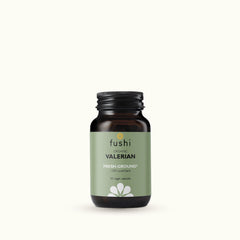Alternative names: Garden Valerian, Garden Heliotrope, Valeriana Officinalis
| Rasa (Taste): | Katu (Pungent), Tikta (Bitter), Kashaya (Astringent) |
| Guna (Qualities): | Laghu (Light for digestion), Snigdha (Slimy in nature) |
| Vipāka (Post-digestive effect): | Katu (Pungent) |
| Vīrya (Energy):: | Ushna (Hot) |
| Karma (Actions): | Balances all the three doshas (Kapha, Pitta & Vata) |

Origin
Valerian is a delicate perennial flowering plant indigenous to Europe and Asia. The root is used in herbal medicine and has a pungent odour - often described as stinky cheese or dirty socks!
Valerian root has a history of medicinal use dating back to Ancient Greece and Ancient Rome; described by Hippocrates and later touted as a remedy for insomnia by Galen, used to treat soldiers for PTSD after the First and Second World Wars.
Valerian is a mild sedative and a superb herb to help calm, balance and bring harmony to mind and body. It is often used to reduce feelings of anxiety, as it can help soothe and pacify the nervous system, while promoting a restful night's sleep. Its calming effect can also permeate the smooth muscle in the body -in your gut and blood vessels- to help ease tension and stress-related stomach cramps.
While balancing to all three doshas, it is an ideal sleep-aid herb as it helps to increase heaviness and kapha (tamas) in the mind - promoting deep and restful sleep.

Valerian Root for Sleep
Lack of quality sleep is a worldwide health concern - exacerbating many serious health conditions, and is often overlooked when it comes to optimising health.
Valerian root is most commonly utilised as a sleep aid, helping to improve quality and quantity and REM sleep. This is due to the sedative-like effects created by the increase of GABA (Gamma-aminobutyric acid) - a neurotransmitter which inhibits or stimulates the activity of neurons and nerve cells throughout the brain and nervous system. This is the same neural-pathway affected by the use of common anti-anxiety drugs and sedatives.

Valerian Root for Anxiety
Valerian has been approved for mild anxiety by the EU’s Herbal Medicines Committee, due to its deep-rooted use in traditional herbal medicine. Valerenic acid and Valerenol are bioactive compounds found within the root of the plant, which promote anti-anxiety agents and pacify the nervous system. Paired with the increase in GABA, Valerian root can significantly aid in reducing anxiety and help with stress management.
Research also suggests that Valerian can help in regulating blood pressure - due to the hypotensive and antispasmodic properties of GABA - calming the heart and nervous system.

Valerian Root for Pain Relief
Valerian root acts as a powerful muscle relaxant, due to its ability to permeate the smooth muscle in the body (found in the stomach and blood vessels), and offering natural sedative and antispasmodic effects. This can help to calm uterine muscle contractions and in relieving menstrual cramps.
Recommended Dosage
For Sleep: 400-900mg, 1-2 hours before bedtime. Once sleep improves, remain using Valerian for 2-6 weeks.
For Stress/Anxiety: 400-900mg, 1-3 times throughout the day (spread evenly throughout the day).
To help carry the medicinal properties of Valerian to deep internal tissues, Ayurveda promotes the use of anupāna when taking your supplements.
Ghee, milk or aloe vera juice is the best anupāna for pitta.
Warm water or ginger tea is the best anupāna for vāta.
While water, hot water, honey or pomegranate juice can be used for kapha.
Does Valerian Have Side Effects?
Valerian root is generally regarded as safe and is well-tolerated.It should not be taken with alcohol or combined with other sleep aids or anti-depressants. For many, it does not cause dependency or withdrawal symptoms, however it is recommended to take a break from using Valerian after 4-6 weeks.
If you are pregnant/breastfeeding or on drug medication, please consult with your Health Practitioner before using Valerian.

* 400 - 900mg Valerian root (powder or tincture)
* ½ tsp ghee/coconut oil
* 1 tbsp cacao
* Milk (or water) of your choice
* Simmer all ingredients for 10-15 minutes
* Blend and/or strain
* Add honey/cinnamon to sweeten as required
Written by Natalie Poppy Sheehan
Nutritionist (BSc, ANutr) & Ayurvedic Massage Therapist (FHT).

